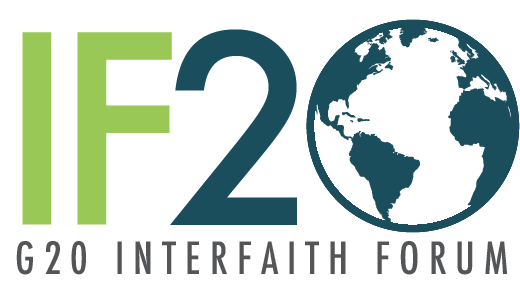
G20 Interfaith Forum Launches in Brasilia with Urgent Call for Environmental Action and Global Cooperation

G20 Interfaith Forum
The G20 Interfaith Forum 2024 officially commenced today, bringing together religious leaders, policymakers, and civil society to address global challenges.
BRASILIA, DISTRITO FEDERAL, BRAZIL, August 21, 2024 /EINPresswire.com/ -- The G20 Interfaith Forum 2024 officially commenced today, bringing together religious leaders, policymakers, and civil society representatives to address pressing global challenges. Under the theme "Leave No One Behind: The Well-being of the Planet and Its People," the opening day of the forum placed a strong emphasis on environmental stewardship and climate action, setting the tone for the three-day event.
Co-hosted by the G20 Interfaith Forum (IF20) and the International Partnership on Religion and Sustainable Development (PaRD), this year's forum aims to contribute faith-based perspectives to the G20 process and the broader global policy agenda.
Mary Robinson, Chair of The Elders and former President of Ireland, delivered a powerful keynote address during the first plenary session. She emphasized the critical role of interfaith cooperation in addressing environmental challenges:
"Imagine the change we can create if we all join our voices," Robinson urged. "We're on the cusp of a wonderful, safer, fairer, cleaner, healthier world. We are moving towards it, but not fast enough for science. Our leaders must accelerate the transition away from extracting industries and fulfill their promises to deliver on the global climate and nature goals."
The forum, taking place from August 20-22, 2024, aims to develop policy recommendations for the G20 Summit later this year. Key focus areas include:
1. Food crises
2. Environment
3. Peacebuilding
4. Debt Relief
5. Human Trafficking & Modern Slavery
Katherine Marshall, Vice President of the G20 Interfaith Forum, highlighted the importance of religious voices in global discussions:
"Some 84% of the world's population has some religious affiliation, and that voice, complex as it is, should be an essential part of global discussions. The voice is expressed in many different voices and cadences, but the core idea is that leaving religious inputs aside is gravely mistaken,” Marshall said. “From there, our idea and objective is to support a structured, systematic, and continuing voice of religious actors in the G20 process."
The forum's first day featured a diverse range of activities and discussions:
● A video message from Ecumenical Patriarch Bartholomew emphasizing environmental concerns
● Panel discussions on Climate Finance and other environmental issues
● A VR video experience of the Amazon rainforest, connecting participants with the region's natural heritage and its importance to both planetary health and indigenous communities
● Sessions on Religious Freedom in Brazil, Food Security, Protecting Sacred Sites, Disinformation and Hate Speech, Women Building Peace, Child Dignity in the Digital World, Poverty and Inequality, and Psychosocial support for displaced populations
Rabbi David Saperstein, in an address during one of the plenary sessions, provided a sobering perspective on the challenges facing humanity. He noted that while the world is not facing entirely new problems, the advanced technology and tools available today have magnified the consequences of poor choices, making them potentially more extreme and irreversible.
"This is the generation that has to get it right," Saperstein emphasized. "In a world where we CAN do almost everything, the moral question of what we SHOULD do becomes all-important. That is where religious voices are absolutely essential."
Forum attendees are seeking to provide those voices to both G20 policymakers and the world at large, striving to improve the future as, in the words of the late Desmond Tutu, "Prisoners of Hope." This sentiment encapsulates the forum's approach: acknowledging the gravity of global challenges while maintaining optimism and determination in addressing them.
The G20 Interfaith Forum is open to global participation through online registration for live sessions at https://www.g20interfaith.org/app/uploads/2020/09/Link-and-Instr.pdf
About the G20 Process
The Group of Twenty, or G20, is the premier forum for international economic cooperation, bringing together the leaders of Earth's most prosperous economies. Collectively, G20 members represent around 80 percent of the world's economic output, two-thirds of the global population and three-quarters of international trade. Throughout the year, representatives from G20 countries gather to discuss financial and socioeconomic issues as well as broader humanitarian issues targeted by the UN's Sustainable Development Goals.
About the G20 Interfaith Forum
The G20 Interfaith Forum seeks global solutions by collaborating with religious thought leaders and political representatives to help shape the overall G20 agenda. It draws on the vital roles that religious institutions and beliefs play in world affairs, reflecting a rich diversity of institutions, ideas, and values. Through its extensive network of networks, it helps prioritize key global policy goals and point toward practical means of implementation at every level of society.
Marianna Richardson
G20 Interfaith Forum
+1 801-692-1442
email us here
Visit us on social media:
Facebook
X
LinkedIn
Instagram
YouTube
Distribution channels: Business & Economy, Human Rights, Politics, Religion, World & Regional
Legal Disclaimer:
EIN Presswire provides this news content "as is" without warranty of any kind. We do not accept any responsibility or liability for the accuracy, content, images, videos, licenses, completeness, legality, or reliability of the information contained in this article. If you have any complaints or copyright issues related to this article, kindly contact the author above.
Submit your press release